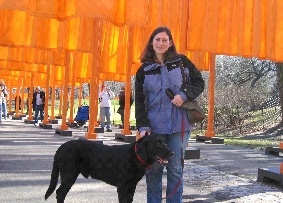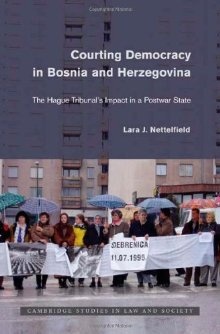


“…Serbia's reward comes at a cost to the Bosnian nation. Former Bosnian foreign minister and United Nations ambassador Muhamed Sacirbey pointed out the irony that "the arrest of Mladic gets Serbia into EU, while consequences of his work, still cleverly and enthusiastically supported by Serbia in Bosnia, keep Bosnia out indefinitely." Bosnia's political structure, established by the Dayton Peace Agreement, locked in Mladic's wartime gains. The creation of two entities, defined by ethnicity, saddled the postwar country with an untenable system of governance. (Full Article authored by Lara J. Nettlefield and Sarah Wagner can be linked at the St. Louis Post-Dispatch - Guest Commentary: Mladic's project thrives in Bosnia or viewed bellow).
After 16 years of evading justice, indicted war criminal Ratko Mladic finally will stand before an international court in The Hague. Charged with war crimes, crimes against humanity and genocide, Mladic led the Army of Republika Srpska throughout the 1992-1995 war in the Republic of Bosnia and Herzegovina. Details of his capture in the tiny village of Lazarevo in northern Serbia especially are meaningful to the 70,000 refugees from Bosnia living in St. Louis, many of whom were displaced by Mladic's forces.
While much has been made of the bribe of European Union accession that finally got Serbia to hand over Mladic, less attention has focused on the project of ethnic division still ongoing in postwar Bosnia.
Mladic was indicted by the International Criminal Tribunal for the former Yugoslavia in 1995. Next to the Bosnian Serb political leader, Radovan Karadzic, currently on trial in The Hague, he was the highest-ranking military officer in the breakaway Serb republic. Media coverage over the past week has highlighted Mladic's suspected role in the Srebrenica genocide. Video footage shows the general announcing his gift of the municipality to the Serb people as forces prepared to slaughter more than 8,000 Bosniak (Bosnian Muslim) men and boys and to expel from their homes 25,000 women, children and elderly.
But as the indictment outlines, Srebrenica was the culmination of a concerted military strategy of criminality that spanned the war in Bosnia. From the siege of Sarajevo to the concentration camps of Prijedor, the mass rapes in Foca, and the fall of the United Nations safe area of Zepa, Mladic is accused of seeking to eradicate non-Serbs from the territory his forces gained.
It was ironic that he was captured in his cousin's home in Lazarevo on Vuk Karadzic street: one of the most horrific crimes committed in eastern Bosnia in April 1992 took place in the Vuk Karadzic elementary school in the town of Bratunac, where Bosniak men, including a local imam, were savagely beaten to death and others summarily executed. Supported politically and militarily by Serbia throughout the war, Mladic advanced the cause of Greater Serbia, and it comes as no surprise that he found refuge there, evading justice for many years.
The Bosnian community of St. Louis reflects the tragic success of Mladic's campaign. Beginning in 1993, waves of refugees came to the city, forced from their homes, often with only a suitcase in hand. The Srebrenica refugees, those who escaped in July 1995, eventually joined them, some arriving as late as 2002.
One look at the restaurants, cafes and small businesses on Gravois Street and the residences in South County shows that the Bosnian community in St. Louis has thrived. But for many of those resettled refugees who travel back to Bosnia periodically, including relatives of missing persons still being unearthed from mass graves dug by Mladic's forces, the traces of his brutal campaign still are evident.
With Mladic's extradiction and legal proceedings underway at The Hague, analysts will argue the merits of international prosecutions. But justice is more than a trial. Mladic's military strategy reflected a political project of division that continues to thwart democratic progress in Bosnia and Herzegovina.
Thus, while Serbia's prospects for accelerated admission into the European Union have brightened, for many Bosnians, it is a bitter pill. Srebrenica survivors have expressed their disappointment that Mladic's arrest is too little too late.
One woman, a returned refugee, commented to the local Bosnian press, "If they had really been honest in their intention to capture him, they would have done it 15 years ago. Now he's just a regular old man who will have it better in The Hague than in the houses in which he's been hiding himself. He'll have his own room, medication, doctors who will treat him. It'll be like a nursing home for him. And I can barely afford medication from my own pension. There's no justice in that."
On another level, Serbia's reward comes at a cost to the Bosnian nation. Former Bosnian foreign minister and United Nations ambassador Muhamed Sacirbey pointed out the irony that "the arrest of Mladic gets Serbia into EU, while consequences of his work, still cleverly and enthusiastically supported by Serbia in Bosnia, keep Bosnia out indefinitely." Bosnia's political structure, established by the Dayton Peace Agreement, locked in Mladic's wartime gains. The creation of two entities, defined by ethnicity, saddled the postwar country with an untenable system of governance.
People may be tempted to applaud Mladic's arrest and assume that the work is done. But the international community that penned the Dayton accords and the Bosnian leadership forced to uphold it must address the constitutional framework that rewarded aggression and that no longer serves this postwar nation. In its layers of diversity, the Bosnian population of St. Louis — and their relatives, neighbors and friends who stayed behind — deserves a Bosnia in which divisions along ethno-national lines do not dominate politics and define identity. Only when this problem is addressed will justice be served.
Lara J. Nettelfield is a visiting associate research scholar at Columbia University's Harriman Institute and is author of "Courting Democracy in Bosnia and Herzegovina: The Hague Tribunal's Impact in a Postwar State" (Cambridge University Press, 2010). Sarah Wagner is an assistant professor in the Department of Anthropology at University of North Carolina, Greensboro, and is author of "To Know Where He Lies: DNA Technology and the Search for Srebrenica's Missing" (University of California Press, 2008). They are completing the book "Srebrenica in the Aftermath of Genocide" (Cambridge University Press, 2012).





